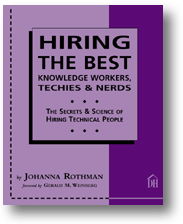|
|
I've
had the opportunity to hire or participate in the hiring of hundreds of technical
people over the years, including developers, testers, technical writers, technical
support staff, pre- and post-sales applications engineers, consultants, leads,
and their managers. I've been part of interview teams charged with hiring
product managers, electrical engineers, mechanical engineers, in-house teaching
staff, and information systems staff. Hiring
technical people has never been easy. Many organizations persist in a near-constant
state of having too few qualified technical workers. When the economy is
strong, we attribute the shortage to too few qualified candidates to fill the
many openings. When the economy is weak, we attribute the shortage to too
many poorly trained applicants with unsuitable backgrounds. Too
often, we apply the same hiring techniques to knowledge workers that we use to
hire skill-based staff. Skill-based staff members possess a set of tools
and techniques that can be applied in the same way in almost all situations.
Technical people -- in particular, knowledge
workers -- must adapt their knowledge to the specific situation. Such workers
are not just the sum of their technical knowledge; they are the sum of both what
they know and how they apply that knowledge to the product. In
particular, how they use their technical skills to benefit the product, how they
manage their work, and how they manage their relationships with other people all
must be assessed when hiring and evaluating a knowledge worker. While
there are some similarities in the hiring process, hiring technical people --
knowledge workers -- is vastly different from hiring purely skill-based staff.
Knowledge workers have unique qualities, preferences, and skills -- such workers
are not fungible assets. The ability to adapt knowledge and to innovate
makes one developer, tester, project manager, or technical manager different from
another. That difference among people is key to making good hiring decisions. You
want your organization to succeed, and so you need to know how to define and assess
a technical candidate's qualities, preferences, and skills, but you also
need to be able to predict a technical person's chance at succeeding in your
organization. The techniques and recommendations set forth in this book
are designed to make hiring a streamlined, efficient, and satisfying experience. Why
Read Hiring the Best? "The
whole interviewing thing takes forever." "How
do I know this candidate will work out?" "I
can't seem to find candidates who meet the job's specifications."
I
hear comments like the preceding every day. If you're like most of the technical
managers I've worked with, you may not be sure how to define the job's requirements,
how to find suitable candidates, what skills you need to interview well, or how
to make an offer that the candidate will accept. Or, possibly, you know
how to do all of that, but the hiring process consumes more of your time than
you comfortably can allocate. Here's
what I hope my book can teach to every hiring manager who uses it as I've intended
it: Save time and money.
The more you streamline your hiring approach, the faster you will be able to evaluate
suitable candidates, and the better the hiring decisions you'll make. An
effective hiring process is especially important when you consider the toll a
bad hire can take on your organization. Add up the direct monetary
costs of recruiting, the cost of the time you and your staff spend on hiring the
person, and the actual cost of the person's salary and benefits while he or she
works for you, and you'll quickly see that the cost of a bad hire can be enormous.
Hire people who can perform the work.
Few things are worse than feeling that a new employee somehow misled you on his
or her résumé or in the interview. You thought you hired Dr.
Jekyll, but Mr. Hyde showed up to work. Screen,
evaluate, and hire the right staff for your specific organization. You
can help yourself hire well by first defining a standard for what "a good
employee" is for your specific organization, and then translating that standard
into precise job requirements, a sound job description, and a comprehensive listing
of information needed for successful interviewing. Fire
fewer people. Most managers dislike the firing process: the warnings,
the get-well plan, the actual firing. Many ignore the problem altogether
or shunt the non-performing employee to other projects or other managers. Develop
and demonstrate your own management competence. Simply put, managers
who can tell the Jekylls from the Hydes will be more successful than managers
who cannot. Likewise, a manager with a staff whose members can work with
others in the company will be able to complete his or her assignments faster and
with greater success. The bottom
line: Once you've defined what a "good employee" means for
your needs and your culture, you can quickly review résumés, conduct
interviews, make offers, and hire the right technical person for the job. I
hope the numerous tips, suggestions, and recommendations in Hiring the Best
will help you expedite the hiring process as well as make it a more pleasurable
experience. |
|
| COPYRIGHT NOTICE:
This excerpt from Hiring
the Best Knowledge Workers, Techies & Nerds [ISBN:0-932633-59-5] appears by permission of
Dorset House Publishing. Copyright © 2004 by Johanna
Rothman . All rights reserved. See
http://www.dorsethouse.com/books/hire.html.
The material contained in this file may be shared for
noncommercial purposes only, nonexclusively, provided
that this Copyright Notice always appears with it. This
material may not be combined with advertisements, online
or in print, without explicit permission from Dorset
House Publishing. For copies of the printed book or
for permissions, contact Dorset House Publishing, 1-800-342-6657,
212-620-4053, http://www.dorsethouse.com,
info@dorsethouse.com,
New: 3143 Broadway, Suite 2B, New York, NY 10027 USA. Additional
rights limitations apply, as presented in the Legal
Disclaimer posted at http://www.dorsethouse.com/legal.html.
|
 |
|
|
|